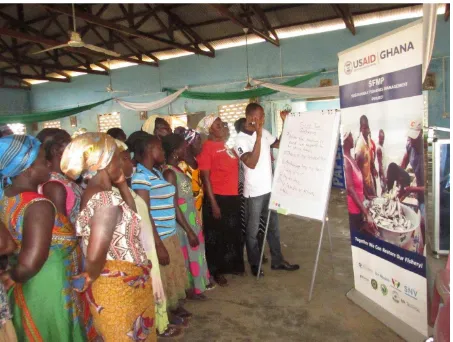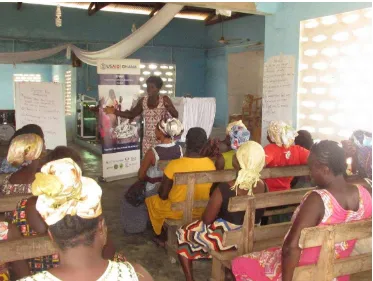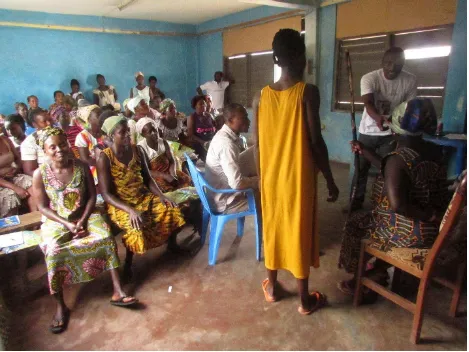SUSTAINABLE FISHERIES
MANAGEMENT PROJECT (SFMP)
Business development training for
100 new Micro Small Medium
Enterprises
This publication is available electronically in the following locations: The Coastal Resources Center
http://www.crc.uri.edu/projects_page/ghanasfmp/
Ghanalinks.org
https://ghanalinks.org/elibrary search term: SFMP USAID Development Clearing House
https://dec.usaid.gov/dec/content/search.aspx search term: Ghana SFMP
For more information on the Ghana Sustainable Fisheries Management Project, contact:
USAID/Ghana Sustainable Fisheries Management Project Coastal Resources Center
Graduate School of Oceanography University of Rhode Island
220 South Ferry Rd.
Narragansett, RI 02882 USA
Tel: 401-874-6224 Fax: 401-874-6920 Email: [email protected]
Citation: Swanzy, S., Kankam, M., (2017). Business development training for 100 new Micro Small Medium Enterprises. The USAID/Ghana Sustainable Fisheries Management Project (SFMP). Narragansett, RI: Coastal Resources Center, Graduate School of Oceanography, University of Rhode Island
GH2014_ACT109_DQF 13 pp. Authority/Disclaimer:
Prepared for USAID/Ghana under Cooperative Agreement (AID-641-A-15-00001), awarded on October 22, 2014 to the University of Rhode Island, and entitled the USAID/Ghana Sustainable Fisheries Management Project (SFMP).
This document is made possible by the support of the American People through the United States Agency for International Development (USAID). The views expressed and opinions contained in this report are those of the SFMP team and are not intended as statements of policy of either USAID or the cooperating organizations. As such, the contents of this report are the sole responsibility of the SFMP team and do not necessarily reflect the views of USAID or the United States Government.
Cover Photo: A drama being performed to give a clear understanding of a topic. Credit:
Detailed Partner Contact Information:
USAID/Ghana Sustainable Fisheries Management Project (SFMP) 10 Obodai St., Mempeasem, East Legon, Accra, Ghana
Telephone: +233 0302 542497 Fax: +233 0302 542498
Maurice Knight Chief of Party [email protected]
Kofi Agbogah Senior Fisheries Advisor [email protected] Nii Odenkey Abbey Communications Officer [email protected]
Bakari Nyari Monitoring and Evaluation Specialist [email protected] Brian Crawford Project Manager, CRC [email protected]
Ellis Ekekpi USAID AOR (acting) [email protected]
SNV Netherlands Development Organisation #161, 10 Maseru Road,
E. Legon, Accra, Ghana 233 30 701 2440 Donkris Mevuta Kyei Yamoah
[email protected] Friends of the Nation Parks and Gardens Adiembra-Sekondi, Ghana 233 312 046 180
Thomas Buck
SSG Advisors 182 Main Street
Burlington, VT 05401 (802) 735-1162
Victoria C. Koomson
[email protected] CEWEFIA
B342 Bronyibima Estate Elmina, Ghana
233 024 427 8377 Lydia Sasu
Darkuman Junction, Kaneshie Odokor Highway
Accra, Ghana 233 302 315894
For additional information on partner activities:
CRC/URI: http://www.crc.uri.edu
CEWEFIA: http://cewefia.weebly.com/
DAA: http://womenthrive.org/development-action-association-daa Friends of the Nation: http://www.fonghana.org
Hen Mpoano: http://www.henmpoano.org
ACRONYMS
CCM Centre for Coastal Management
CEWEFIA Central and Western Region Fishmongers Improvement Association CRC Coastal Resource Center
CSLP Coastal Sustainable Landscape Project DAA Development Action Association
DFAS Department of Fisheries and Aquatic Science DMFS Department of Marine Fisheries Sciences DQF Daasgift Quality Foundation
FtF Feed the Future
GIFA Ghana Inshore Fishermen's Association GIS Geographic Information System
GNCFC Ghana National Canoe Fishermen’s Council
HM Hen Mpoano
ICFG Integrated Coastal and Fisheries Governance MESTI Ministry of Environment Science and Technology MOFAD Ministry of Fisheries and Aquaculture Development NDPC National Development Planning Commission
NGOs Non-Governmental Organizations
SFMP Sustainable Fisheries Management Project SMEs Small and Medium Enterprises
SNV Netherlands Development Organization
SSG SSG Advisors
STWG Scientific and Technical Working Group UCC University of Cape Coast
URI University of Rhode Island
TABLE OF CONTENTS
CONTENTS
ACRONYMS ... iii
TABLE OF CONTENTS ... iv
LIST OF FIGURES ... iv
LIST OF TABLES ... iv
INTRODUCTION ... 1
Terms of Reference ... 1
METHODOLOGY ... 1
REPORT ON TRAINING ... 1
Success Story ... 5
Lessons Learnt ... 5
CONCLUSIONS... 5
RECOMMENDATIONS ... 5
APPENDIX ... 6
LIST OF FIGURES
Figure 1 Training session at Asanta with Michael Kankam (assistant project officer) leading facilitation ... 2Figure 2 Training session at Asanta with Stephen Swanzy (project officer / M&E) leading facilitation ... 3
Figure 3 A trainee (Juana Adjei) allowed to do presentation on one of the courses learnt previously ... 3
Figure 4 Percentage of MSME's registered for training ... 4
Figure 5 A drama being performed to give a clear understanding of the topic ... 4
INTRODUCTION
The sustainable fisheries management project, a five-year project is in its third year and Daasgift continue to develop fisher folks to improve upon their livelihood. Hundred fish processors in the year were selected to undergo this training, 60 from Akyinmu community in Axim and 40 from Asanta all in the western region
.
Terms of Reference
Total number of MSMEs registered for training
Week 1, topic - group dynamics,
Week 2, topic -roles and responsibilities of group leaders/ executives,
Week 3, topic - importance, formulation and adoption of regulations,
Week 4, topic - savings culture/savings procedure/savings mobilization,
Week 5, topic- business plan,
Week 6, topic - loans procedure,
Week 7, topic - financial literacy and records keeping,
Week 8, topic - safety and healthy fish handling,
METHODOLOGY
The methods used for the MSME training were as follows.
Face to face / interactive training: The facilitators used marker boards, flip charts and projector for their teachings and presentations and as well allowed the training session to be more interactive were participants got chance to express their views and ask questions. Group discussions: Participants were sometimes grouped for assignments and discussion to answer questions asked according to the manual with the help of the facilitator.
Role Play
REPORT ON TRAINING
The lack of business development and management skills among majority of fish processors to expand their businesses and also create an alternative livelihood is an important concern that can be addressed by business management training.
The general objective of the program was to provide business development and management training by educating fish processors to mobilize their own resources through savings and credit activities with a view to improving the socio-economic conditions of the community, their business, community members and creating alternative livelihood.
Some specific objectives of the course include helping participants:
understand the background, current status and where their organization needs to go in order to accomplish vision and become better developed.
to be abreast with money management, understanding and adopting a culture to save.
to become credit worthy.
to aid the members to know and appreciate the meaning of unified group and its role,
to assist members to understand why it is necessary to have a leadership committee.
to help them recognize the role of leadership committee and the different positions involved, to prompt members to define the responsibilities, qualities and mandate of their leaders, to elect leadership committee.
to discuss the modalities for the elaboration and adoption of the internal regulation. The training was organized for 100 new fish processors, comprising 40 from Asanta and 60 from Akyinmu in Axim all in the western region. The 100 processors comprise 99 women and 1 man. The training was attended by majority of its trainees since its commencement in the month of January to the month of March 2017.
Table 1 Total number of MSMEs registered for training
Name of Town Axim Asanta Total
Number of MSMEs registered for training
60 40 100
The following outcomes and impacts were expected as a result of the training received; good record keeping, savings culture, credit worthiness, good business planning, hygienic fish handling and packaging, increased income and marketing skills would be exhibited in the lives and businesses of the 100 fish processors.
Figure 2 Training session at Asanta with Stephen Swanzy (project officer / M&E) leading facilitation
Figure 4 Percentage of MSME's registered for training
Success Story
About 80% of the entire trainees have been assessed by the credit officer of Daasgift and result proves positive for them to access credit.
Lessons Learnt
The members respond very well in group activities rather than individual assignments.
They were committed to longer training period and have asked for more training and still call to find out for the next training even though training has ended.
Previous trainings in the communities inspired some of the fisher folks to be engaged in the just ended training.
CONCLUSIONS
The training has envisaged financial ideas for establishing their mentality and orientation of their mindset to strengthen their businesses and for community development.
The eight week MSME training was well organized with all the trainees satisfied with lessons taught and knowledge acquired, they also appreciated the avenue of going in for loans and saving in the bank.
The eight-week training program was successfully held in both Axim and Asanta. It was one of the more exciting training programs because it became an eye-opener for the participants on the need to have a business plan.
Leaders were allowed to give their views on the program and to our amazement they wish for us to extend the date.
RECOMMENDATIONS
More such training can be organized to help the fisher folks and enlighten them on certain issues applying to their businesses.
The NGO’s engagement in Micro, Small and Medium scale Enterprises should be a continual
commitment which should even involve mostly the youth in the coastal regions and more especially youth fisher folks for them to be employable and as a way ease the huge burden on the sea.
NGO’s can also improve the venue or centers where community meetings and trainings are
held as part of aiding development.
APPENDIX
BUSINESS DEVELOPMENT TRAINING ATTENDANCE PER PARTICIPANTS
NO. NAME Number of
Days for Attendance:8
Number of Days Attended
Number of Days Absented
11 EZUAH NYAMEKEH
TANOE
8 5 3
12 BEATRICE TETTEH ARMAH
8 7 1
13 GRACE CHRISTIAN 8 7 1
14 COMFORT KWOFIE
NO. NAME Number of Days for Attendance:8
Number of Days Attended
NO. NAME Number of Days for Attendance:8
Number of Days Attended
Number of Days Absented
78 ELIZABETH QUAICOE 8 5 3
79 ESI EDUFUA 8 7 1
80 AMA KALAWA 8 4 4
81 SANDRA NYIMPAYIE 8 3 5
82 DIANA ABRAKWAH 8 4 4
83 SARAH ACKON 8 7 1
84 ROSE KOOMSON 8 7 1
85 ERNESTINA KWOFIE 8 7 1
86 AMA ADOMA 8 8 0
87 ADWOA ALAGYIRBA 8 8 0
88 EFUA NYAME 8 6 2
89 ELIZABETH APPIAH 8 7 1
90 ELIZABETH GOKEH ANSAH
8 3 5


